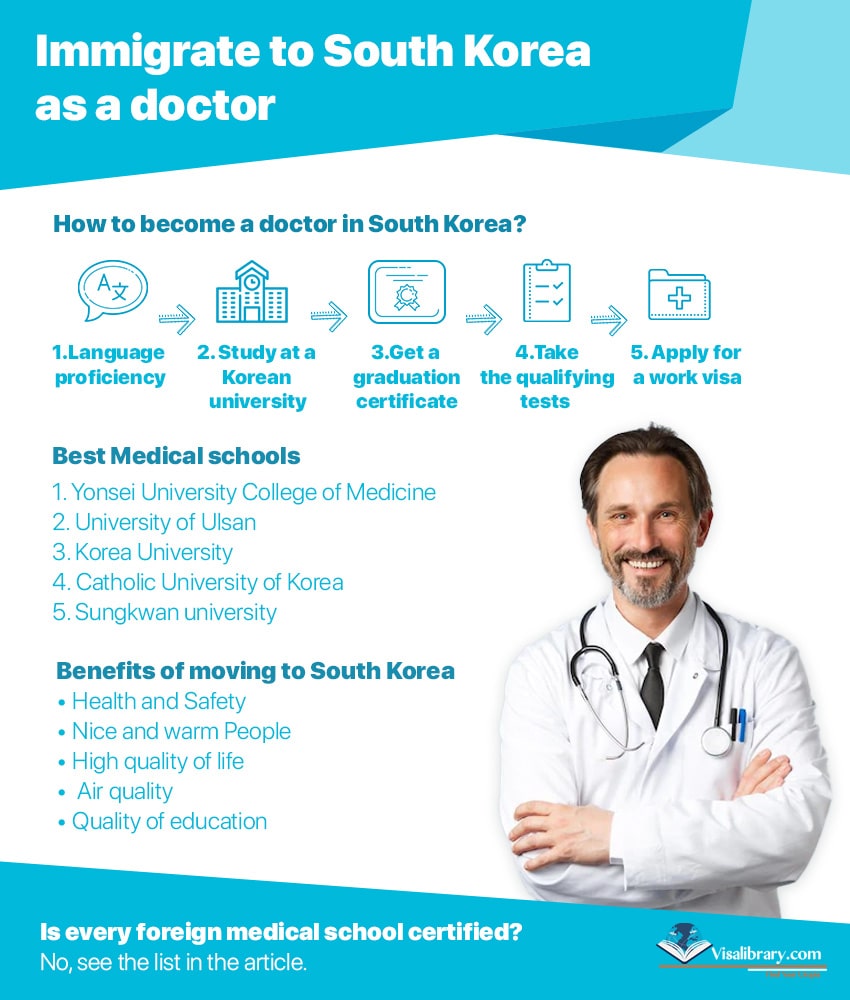South Korea is a global powerhouse with a top economy, fast internet, and an advanced railway system. The country needs doctors more than ever. Do you want to become a doctor in South Korea? Our complete guide walks you through the steps. Let’s dive in!
How to Become a Doctor in Korea as a Foreigner?
Knowing how to become a doctor in Korea as a foreigner speeds up your process. To become a doctor in South Korea, you need to:
- Complete medical school: You can earn a Bachelor of Medicine, Bachelor of Surgery (의학사) degree after six years of study at one of the 40 universities in South Korea that offer medical education.
- Pass the National Medical Licensing Examination: You must pass this exam to obtain a medical license.
- Complete a mandatory annual refresher education: The government requires doctors to complete this annual education. You can also pursue a Master of Medicine (의학석사) or Doctor of Philosophy in Medicine (의학박사) degree.
If you want to become a Traditional Korean Medical Doctor, you must:
- Pass the National License Exam (Traditional Korean Medical Doctor’s License Examination)
- Complete a mandatory annual refresher education
- Complete training at a nationally designated training hospital
- Pass a National Exam (Traditional Korean Medical Doctor Qualification Exam)
Being a doctor in South Korea is considered a highly sought-after profession. According to a survey, the top 20 university majors in the country were all in the medical field.
Get the FREE Cheat sheet for
Immigrate to South Korea as a Doctor
Salary of Foreign Doctors in South Korea
Aside from knowing how to become a doctor in Korea, you need to consider the doctor salary in South Korea. Foreign doctors working in South Korea can, on average, make $100,000 per year, but this varies widely based on their field and experience. Here are more details about the doctor salary in South Korea for foreigners:
- General practitioners make $50,000 – $80,000 annually.
- Specialists can earn $100,000 – $150,000 annually.
- Highly experienced doctors earn up to $200,000 or more annually.
- Private hospital doctors can typically make more than those in public hospitals.
- Doctors in major cities often receive better pay than those in rural areas.
How Long Does It Take to Be a Doctor in Korea?
It is rigorous and time-consuming to learn how to become a doctor in South Korea. Timeline, roughly speaking:
- 3 years of high school
- 4 years of Bachelor’s Degree
- 6 years of medical school
- 1 year of internship
- The typical residency lasts between 3 and 7 years, though this varies widely by specialty.
- Preparation time for the Korean Medical Licensing Exam (KMLE) is a significant factor in determining the time needed to become licensed or certified.
- Specialization is elective, and if you go that route, you should plan on spending three to five more years in school.
How to Become a Doctor in South Korea?
To learn how to become a doctor in South Korea as a foreigner, you have to follow the below procedures. Read them carefully and bear in mind the details:
Step 1. Preparatory education
Completing high school or an equivalent education is the first necessary step. Strongly emphasize science subjects such as biology, chemistry, and physics to achieve high grades in these areas if you wish to become a doctor in South Korea.
Step 2. Undergraduate education (Bachelor’s Degree)
Medical careers in South Korea typically begin with undergraduate studies. Those who want to enter the medical field typically earn a bachelor’s degree in biology, chemistry, or a pre-med program. This preparatory education ensures exposure to fundamental science courses that form the basis of medical knowledge and provide a solid academic background.
Step 3. Language proficiency
If you want to become a doctor in South Korea, it is essential to be fluent in Korean. TOPIK is the language proficiency test, which stands for Test of Proficiency in Korean. You need a certificate with a score of 5 or higher to be eligible for the tests. Without such a score, you may not get the license.
Step 4. Pass the medical college admission test
The K-MET, or Korean Medical Education Eligibility Test, is South Korea’s version of the MCAT. This test aims to objectively evaluate a candidate’s level of preparation for medical school by testing their grasp of fundamental concepts in areas such as biology, chemistry, physics, and others. While the specific format and content of the exam may change from year to year, it will typically consist of multiple-choice questions and a written essay or interview section.
Read our latest article and learn how to immigrate to South Korea as a nurse.
Step 5. Study at a Korean university
To become a doctor in South Korea, attend a Korean university. Both international and domestic students must follow the same application process. SAT or TOEFL language proficiency exams are required for admission to 36 medical colleges in South Korea. Visit their websites for information on specific admission requirements. Each university sets its own score standards for these exams.
You’ll spend six years training in a medical school after being admitted. During the first two years, students study subjects such as anatomy and physiology in the classroom. As you progress through the four years of medical school, you will have the opportunity to rotate through different specialties through clinical rotations. Follow your university’s admission guidelines carefully as you begin your academic journey.
There are language and academic requirements for international students. Select a medical school whose interests align with yours, complete the application process, submit proof of financial stability, and apply for a student visa. Strong language proficiency is essential for CSAT testing, which is administered in Korean.
Step 6. Have a doctor’s license and graduation certificate
Let’s continue answering “How to become a doctor in Korea?” A foreigner must first have a license from their home country.
To practice medicine in South Korea after medical school, pass the Korean Medical Licensing Exam (KMLE). The next step is to apply to the Korean Medical Association or the Ministry of Health and Welfare’s medical licensing board. Keep updated on any changes to the certification process and maintain your medical license by attending an accredited university.
The following documents are usually required to get a doctor’s license and graduation certificate in South Korea:
- KMLE Examination Results
- Identification Documents (e.g., passport or national ID)
- Graduation Certificate
- Academic Transcripts
- Application Forms
- Letters of Recommendation (if required)
- Proof of Language Proficiency
- Financial Documents (e.g., bank statements)
- Criminal Background Check (if required)
- Passport Photos
Step 7. Internship and Residency
A one-year internship awaits you after you pass the Korean Medical Licensing Exam (KMLE). You can apply your knowledge in a clinical setting through this hands-on experience.
The next step after your internship is to enter your chosen medical specialty’s residency program, which typically lasts 3-4 years. By completing rotations and patient care, you’ll gain specialized knowledge, develop clinical skills, and work closely with mentors.
Step 8. Board Certification
When you’ve finished your residency and met all the requirements, you can apply for board certification in your field of medicine. This credential attests to your mastery of a specialized field of medicine. Passing additional exams that test your expertise in your field is usually required to earn board certification. Earning board certification is an outstanding feat that demonstrates to patients and peers that you are at the pinnacle of your profession.
Step 9. Continuing Education and Renewal
To truly learn how to become a doctor in South Korea, you must actively participate in continuing medical education to maintain your medical license and stay current. This requires regular attendance at specialty-related seminars, workshops, and training programs. Doctors in South Korea must renew their licenses periodically. CME helps you stay competent and meet license renewal requirements.
Step 10. Practice or Employment
After medical school, internship, residency, and board certification, you’re ready to practice medicine in South Korea. You can work in hospitals, clinics, research, or education. Many South Korean doctors practice clinically. Others choose research to advance medicine or education to train future doctors. Choice of practice or employment depends on interests and career goals. You must apply for a South Korea visa to work in the country.
The Components of the KMLE Exam in South Korea
The question is, “What is the medical License exam in South Korea?” The KMLE exam in Korea (Korean Medical Licensing Examination) tests the abilities of those studying to become medical doctors. The clinical skills test is from September to November, and the written test is in January. Two components make up the KMLE:
Written Examination
- The theoretical knowledge in anatomy, physiology, pharmacology, pathology, and clinical medicine is tested in the written part.
- The written exam will consist of multiple-choice questions based on medical case studies, images for diagnosis, and hypothetical clinical scenarios.
Practical Examination
- Objective structured clinical examinations (OSCEs) are used to evaluate students’ clinical knowledge and proficiency during the practical part of the program.
- Candidates in the OSCEs move around to different stations, each simulating a different clinical situation. Their diagnostic and therapeutic skills, as well as their ability to communicate with standardized patients, are assessed.
Medical Residency in South Korea for International Students
If you are an international student looking to do your medical residency in South Korea, you need to first graduate from a recognized medical school and pass the Korean Medical Licensing Examination (KMLE). Your program requires you to have Korean language proficiency, as your training is in Korean. Since securing a residency position can be competitive, building strong connections in the Korean medical community and gaining experience through internships can improve your chances of acceptance into a residency program.
Read our latest article and learn how to immigrate to South Korea as a pharmacist.
What are the Benefits of Immigration to South Korea as a Doctor?
Foreign doctors in South Korea might find the benefits of immigration to South Korea as a doctor fascinating. Insurance in South Korea costs 4% of your salary, making healthcare affordable. Clinic access is simple and cheap. Pre-pandemic public health was good, and the government managed well due to trust. Low crime creates safety. Though there’s some initial distance, making friends in smaller cities is easy because the people are friendly. Korea offers convenient services, efficient delivery, and advanced technology for a high quality of life. Air quality is good, and math and language education is widespread.
How to Become a Doctor in South Korea from India?
Indian international students must speak Korean well to become doctors in South Korea. After completing your prerequisites in India:
- Pursue a medical degree.
- Before applying to South Korean medical schools that accept international students, take the K-MET and Korean language tests.
- If you get a student visa, study medicine for six years and do an internship for a year.
South Korea requires passing the Korean Medical Licensing Exam to practice medicine. Select a medical subspecialty. This rigorous process requires time, effort, and strict adherence to educational institution and regulatory body deadlines.
Let’s sum up…
You can immigrate if you know how to become a doctor in Korea and you are qualified. This article explains who is eligible to move to South Korea as a doctor and how to do it. You got familiar with the list of approved medical schools in South Korea, and the application process was explained in detail.
If you have questions, write them down in the comment section. Visit the Visa Library articles from the right sidebar to learn how to get your required visa.
Frequently Asked Questions about Immigrate to South Korea as a Doctor
Can a foreigner work as a doctor in South Korea?
Specific licensing and language proficiency requirements exist for foreign doctors working in South Korea.
Which doctors are in demand in South Korea?
In South Korea, doctors are in high demand in various specialties, especially internal medicine and surgery.
Can a doctor settle in South Korea?
A licensing process and specific visa requirements must be met before doctors can settle in South Korea.
Which doctor is most needed in Korea?
South Korea has a high demand for general practitioners and specialists, especially in underserved areas.
Is there a shortage of doctors in Korea?
South Korea, especially its rural areas, has a doctor shortage.
Is a Korean medical degree valid in the USA?
Obtaining a Korean medical degree in the United States is possible, but it is usually subject to additional certifications and exams.
What do you need to work as a doctor in South Korea?
The requirements for becoming a doctor in South Korea include completing medical education, passing licensing exams, and obtaining a visa.
Can a foreigner be a surgeon in Korea?
Licensed foreign surgeons can work in Korea if they meet language proficiency and licensing requirements.
Which doctor is highly paid in South Korea?
The highest-paid doctors in South Korea tend to be surgeons and specialists in fields such as neurosurgery, plastic surgery, and orthopedic surgery.
How useful was this article?
Click on a star to rate it!
Average rating 4.2 / 5. Vote count: 53
No votes so far! Be the first to rate this article.
- Author
- Max-B.
- September 24, 2022







19 Comments
Hey I am from Pakistan.I am currently in 1 year of mbbs.I wanna go to korea after having license but none of the university of Pakistan is approved by Korea
No Pakistani universities are recognized by South Korea, so it will be difficult to use a medical license obtained in Pakistan to practice medicine there. Get your medical license in Pakistan after completing your MBBS program. The next step is to look into schools in South Korea that offer medical degrees to international students. Many courses are taught in Korean, so language proficiency is a high priority. Review your medical background and experience, and think about furthering your education with a residency or fellowship in South Korea. Additionally, keep yourself updated on the latest visa regulations and South Korea’s policies regarding foreign medical professionals. Experts and educational advisors should be consulted for assistance with this intricate procedure.
Hi!! I’m a doctor from one of the universities listed above. I would like to do a residency/specialty in Korea, like pediatric. In order to do that I have to take the KMLE only or take the the test and be admitted to an university? What are the steps to do a medical residency there and eventually work as a specialist in Korea?
Usually, you have to take the Korean Medical Licensing Examination (KMLE), which has both written and hands-on parts, to get a medical residency and work as an expert, like in pediatrics, in Korea. After passing the KMLE, you can apply to universities or hospitals with residency programs in your chosen specialty. Once you’re accepted, you’ll have to go through a few years of residency training, which will include clinical experiences and classes. After you finish your training, pass any necessary exams, and get your full license, you can work as a specialist in Korea, either in a hospital or in a private practice. Because the process can be different, it’s important to check the program’s standards and contact the school for more information.
Hey zainb there I am in 2nd year mbbs . If you found something , let me know .
Hi…I am currently a medical student studying in class 11th in order to clear National Entrance cum Eligibility Test in my home country,India.I plan to pursue my medical degree from India.But I want to immigrate to South Korea for my Post Graduation degree in Medical field.Could you please guide me on how I can do it?
Follow these steps to study medicine at a graduate level in South Korea:
Find out about medical programs in South Korea and make sure you meet the academic requirements.
Prepare the documents you need, such as transcripts and language tests.
Apply to the South Korean universities you want to attend before the deadlines.
Get a student visa (D-2) from the embassy or consulate of South Korea.
Plan ahead for tuition, living costs, health insurance, and housing.
Go to orientation and get used to campus life in South Korea.
Find out what’s new with immigration and universities.
Keep in mind that the requirements may change, so talk to South Korean universities and experts for the most up-to-date information.
Hii,I am from India but here is not any medical College approved by korean ministry.so can you give information about that two years preparation exams
Doctors who were trained outside of South Korea and want to work there must take a two-year course to get ready. This course gives you a lot of practice with the Korean language, which is used in South Korean medical practice. Participants also get medical training to help them learn about Korean healthcare practices, ethics, and rules. At the end of this program, candidates must pass the Medical Licensing Examination for Foreign Medical Practitioners (MLEFMP) to show that they understand Korean medical laws and ethics. Once they pass, they can apply for a limited medical license. Before they can get a full license to practice medicine in South Korea, they may have to work under supervision.
Hey… I’m Dona I’m from India but I studied in Russia and my university is not approved by Korean ministry. I am currently in 1 year of mbbs.I wanna go to korea after having license is there any possibilities to do my job in Korea
Here are some things to think about if you want to practice as a doctor in South Korea after completing your first year of MBBS in Russia and getting your license there: Learn the language, look for work in South Korean healthcare institutions, get a job offer, apply for a work visa (E-7) at the Korean embassy or consulate, register with the appropriate South Korean medical authorities, and acclimate to the Korean healthcare system. Keep in mind that knowing Korean is essential for finding work and providing quality healthcare in South Korea, and double-check the most up-to-date information with the appropriate South Korean authorities.
Hey… I am Donna, I am from India but I am studying in Russia and my university is not approved by Korean ministry. I am currently in first year of MBBS. I want to go to Korea after getting the license, is there any possibility for me to get a job in Korea?
After completing your MBBS program in Russia and receiving your license, you may like to consider working in South Korea. Complete your education and licensing requirements, perfect your command of the Korean language, scour Korean healthcare institutions for employment prospects, accept an offer of employment, apply for a work visa (E-7), register with the proper medical authorities, and acclimate to the Korean healthcare system. Please be aware that speaking and comprehending Korean is essential for finding work and providing quality healthcare in South Korea. If you want accurate, up-to-date information, it’s best to double-check with the appropriate South Korean authorities.
Hey… I am Megha , I am from India but I am studying in Russia and my university is not approved by Korean ministry. I am currently in first year of MBBS. I want to go to Korea after getting the license here I want to immigrate to South Korea for my Post Graduation degree in Medical field.Could you please guide me on how I can do it?
After completing your MBBS program in Russia, you may want to think about continuing your medical education in South Korea. You should first get your MBBS degree and license. It’s important for international medical students to double-check the entry standards of universities in South Korea. Keep in mind tests of language competence, such as the TOPIK for Korean language abilities. Submit your applications to medical schools in South Korea that offer graduate-level study. Learn how to get your international degrees recognized by contacting the relevant colleges. After acceptance, you should contact the Korean embassy or consulate in Russia to apply for a student visa (D-2). Start your postgraduate medical education in South Korea after arriving there and attending any essential language classes. Contacting both universities and the South Korean Ministry of Education will keep you apprised of any changes to admissions requirements.
Hey… I am Megha , I am from India but I am studying in Russia and my university is not approved by Korean ministry. I want to go to Korea after getting the license here and I want to do my post graduation degree from South Korea in Medical field.Could you please guide me on how I can do it..?
These are the steps you need to take to enroll in a post-graduate medical program in South Korea. Get your medical degree and license in Russia first. The next step is to research the prerequisites for entering the programs of interest at any South Korean university. Get ready to take an exam to prove your command of the target language, like the TOPIK for Korea. Submit applications to schools in South Korea that will accept your international credentials. After being approved, you should contact the Korean embassy or consulate in Russia to apply for a student visa (D-2). Plan a trip to South Korea, where you can start your post-graduate medical education after you’ve finished any prerequisite language classes. Always double-check that you’ve met all the requirements by contacting the universities and the South Korean Ministry of Education.
Hi ,
I am from India (home country )did my mbbs degree in Philippines after graduation returned India and I got my Indian medical licence I don’t have Philippine medical licence , now I m planning to do my residency in US .I am taking
Korean classes for language proficiency in India. my university where I did my mbbs is not approved by Korean ministry , is there any possibility to get medical licence in Korea to work there as doctor in future .
In South Korea, obtaining a medical license can be challenging if your degree does not come from a university recognized by the Korean Ministry of Health and Welfare. South Korea may not recognize your degree and have different requirements for practicing medicine than India, the Philippines, or the United States. For more information about specific pathways and requirements for foreign-trained doctors, consult the Korean Medical Association or the appropriate South Korean authorities.